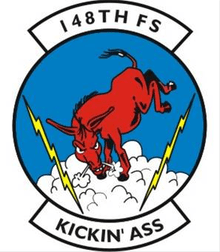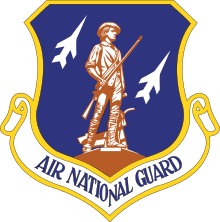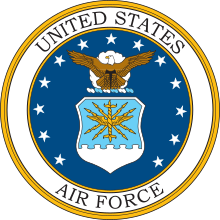148th Fighter Squadron
The 148th Fighter Squadron (148 FS) is a unit of the Arizona Air National Guard 162d Fighter Wing located at Tucson Air National Guard Base, Arizona. The 148th is equipped with the Block 20 F-16A/B Fighting Falcon.
| 148th Fighter Squadron | |
|---|---|
 148th Fighter Squadron 4-aircraft F-16 formation | |
| Active | 1985-Present |
| Country | |
| Allegiance | |
| Branch | |
| Type | Squadron |
| Role | Foreign Military Sales pilot training |
| Part of | Arizona Air National Guard |
| Garrison/HQ | Tucson Air National Guard Base, Tucson, Arizona. |
| Nickname(s) | "Kickin' Ass" |
| Tail Code | Arizona state flag tail stripe "AZ" |
| Insignia | |
| 148th Fighter Squadron emblem |  |
Mission
The 148th Fighter Squadron specializes in the training of F-16 pilots for foreign air forces which have purchased the aircraft via the Foreign Military Sales program.
History
Pennsylvania Air National Guard
In May 1946, the 347th Fighter Squadron was redesignated the 148th Fighter Squadron, Single Engine and allotted to the Pennsylvania Air National Guard unit. The 148th was stationed at Reading Municipal Airport, Pennsylvania and equipped with F-51D Mustangs.
In February 1951 the squadron was called to active duty and redesignated the 148th Fighter-Interceptor Squadron. It was assigned to the 113th Fighter-Interceptor Group and moved to Dover Air Force Base, Delaware[1] as part of Air Defense Command (ADC) with an air defense mission for Southeastern Pennsylvania and Philadelphia. In September the squadron upgraded to jet propelled and air intercept radar equipped Lockheed F-94 Starfire aircraft.[1]
However, ADC was experiencing difficulty under the existing wing base organizational structure in deploying its fighter squadrons to best advantage.[2] Accordingly, in February 1952, it inactivated the 113th Wing and its elements and reassigned the 148th to the 4710th Defense Wing,[3] which was organized on a regional basis. On 1 November 1952 the 148th was returned to the control of the State of Pennsylvania[1] and its personnel, equipment and mission were transferred to the 46th Fighter-Interceptor Squadron, which was simultaneously activated at Dover.[4]
The 148th returned to the Pennsylvania guard and its F-51s. With the end of the line for the Mustang in USAF service, the United States Air Force, in an effort to upgrade to an all jet fighter force, required Air National Guard Air Defense Command units to upgrade to jet-powered aircraft. The Reading Airport Commission and National Guard authorities found themselves in a conflict over the use of Reading Municipal Airport for tactical jet operations. Unable to resolve these differences the Air Force inactivated the 148th Fighter-Interceptor Squadron on 30 June 1956.
However, the National Guard Bureau's and the Commonwealth of Pennsylvania's desire to retain the unit brought a new mission and a numeric designation to the organization, the 140th Aeromedical Transport Squadron which was allotted to the Pennsylvania Air National Guard, and activated on 1 July 1956 using propeller-driven aircraft. The 140th ATS was bestowed the lineage and history of the inactivated Pennsylvania ANG 148th Fighter Interceptor Squadron.
Today, that organization exists as the Pennsylvania Air National Guard 193d Special Operations Squadron at Olmsted Air National Guard Base, Middleton, Pennsylvania.
Arizona Air National Guard
Designation transferred by the National Guard Bureau to the Arizona Air National Guard on 15 October 1985 and re-designated as the 148th Tactical Fighter Training Squadron. The 148th TFTS was established as a new organization, with no historical lineage to the previous 148th FIS.
Assigned to the 162d Tactical Fighter Training Group at Tucson International Airport, Arizona. The 148th TFTS was tasked with pilot training for the foreign air forces as part of the Foreign Military Sales program, although the squadron has also been tasked with training F-16 crew for the USAF and the Air National Guard both advanced and beginner training. Through the years numerous countries have detached personnel to receive advanced training by the squadron.
The first to make use of these was the Royal Netherlands Air Force (RNLAF). Training used a mix of USAF F-16 as well as some Dutch F-16s. Eventually a total of eight RNLAF F-16s were on hand. These Dutch aircraft were hard to tell apart from the USAF as they had the same markings and were the same blocks. In 1991, the squadron was officially tasked with a NATO F-16 training mission which was not much of a departure from the norm. The squadron was re-designated as the 148th Fighter Squadron on 15 March 1992 and the training role continued. By May 1995 all the RNLAF F-16s had departed Tucson for their native country.
In 2003 another contract was signed that included detaching foreign F-16s. These new F-16s would be the E/F models of the United Arab Emirates Air Force. It wasn't until 2 September 2004 that UAE students were able to train with the F-16E/F when it arrived at Tucson. Most pilots came from Mirage 2000 or the Hawk. The first class of graduates was made complete in April 2005. During the course of 2010 these aircraft returned to the UAE to form a new fighter squadron. The relationship ended on 20 October 2010 with over 100 UAE F-16 pilots trained. The last aircraft departed for UAE during December.
2010 saw a new contract with the RNLAF. The Dutch already had a detachment with the 162d Fighter Squadron of the Ohio Air National Guard. This unit was to lose its F-16 task and so the Dutch needed to search for another training site. The USAF then proposed the 148th FS. So an influx of Dutch F-16AM/BM airframes began December 2010. The first class of about ten pilots graduated in late April 2011.
Lineage
- 347th Fighter Squadron redesignated 148th Fighter Squadron and allotted to the National Guard on 24 May 1946
- Federally recognized
- Called to active Federal Service in February 1951
- Redesignated 148th Fighter-Interceptor Squadron in February 1951
- Released from active Federal Service on 1 November 1952
- Inactivated on 30 June 1956 and withdrawn from the Air National Guard
- Redesignated 148th Tactical Fighter Training Squadron and allotted to Arizona Air National Guard, 1985
- Extended federal recognition and activated, 15 October 1985
- Redesignated: 148th Fighter Squadron on 15 March 1992
Assignments
- 113th Fighter-Interceptor Group, February 1951
- 4710th Defense Wing, 6 February 1952 – 1 November 1952
- 162d Tactical Fighter Training Group, 15 October 1985
- 162d Fighter Group, 15 March 1992
- 162d Operations Group, 11 October 1995 – Present
Stations
- Reading Municipal Airport, Pennsylvania, federal recognition
- Dover Air Force Base, Delaware, February 1951 - 1 November 1952
- Reading Municipal Airport, Pennsylvania, 1953 - 30 June 1956
- Tucson International Airport, Arizona (ANG portion designated: Tucson Air National Guard Base 1991), 10 October 1985 – present
Aircraft
- North American F-51D Mustang, -1951; 1953-1956
- Lockheed F-94 Starfire, 1951-1952
- Block 20 F-16C/D Fighting Falcon, 1985 – present
References
Notes
- Cornett, Lloyd H; Johnson, Mildred W (1980). A Handbook of Aerospace Defense Organization, 1946–1980 (PDF). Peterson AFB, CO: Office of History, Aerospace Defense Center. p. 123.
- Grant, C.L., (1961) The Development of Continental Air Defense to 1 September 1954, USAF Historical Study No. 126, p. 33
- Cornett & Johnson, p. 67
- Maurer, Maurer, ed. (1982) [1969]. Combat Squadrons of the Air Force, World War II (PDF) (reprint ed.). Washington, DC: Office of Air Force History. p. 204. ISBN 0-405-12194-6.
Bibliography
![]()
- Cornett, Lloyd H; Johnson, Mildred W (1980). A Handbook of Aerospace Defense Organization, 1946–1980 (PDF). Peterson AFB, CO: Office of History, Aerospace Defense Center.
- Grant, C.L., (1961) The Development of Continental Air Defense to 1 September 1954, USAF Historical Study No. 126
- Maurer, Maurer, ed. (1982) [1969]. Combat Squadrons of the Air Force, World War II (PDF) (reprint ed.). Washington, DC: Office of Air Force History. ISBN 0-405-12194-6.
- Rogers, Brian. United States Air Force Unit Designations Since 1978. Hinkley, UK: Midland Publications, 2005. ISBN 1-85780-197-0.


